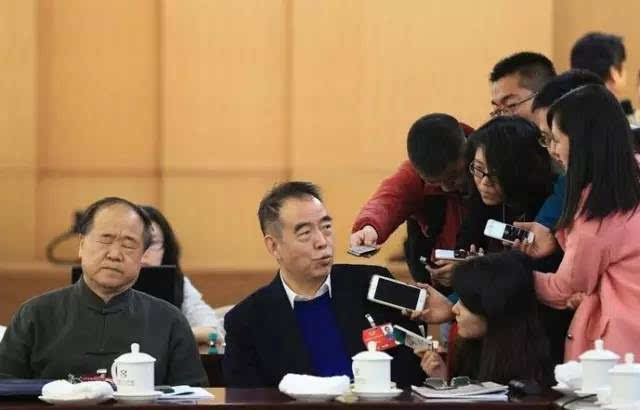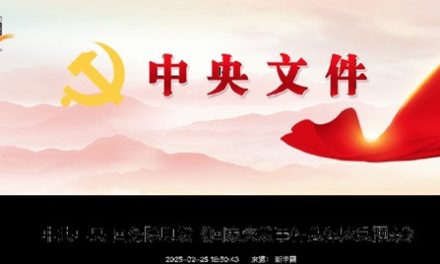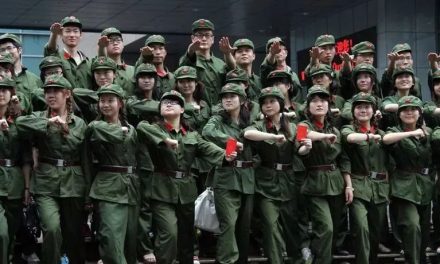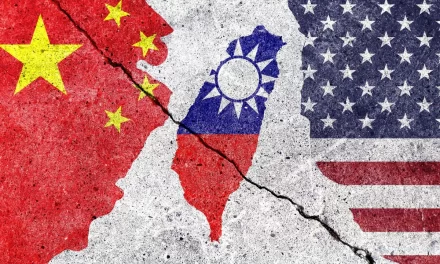By Liu Fang Mar 9, 2024
Editor’s note: the Chinese writer and Nobel laureate has recently been descended upon by China’s illiberal swarms for alleged offenses against the untouchable things in contemporary China. The author uses the incident, a lawsuit, as a launching point to discuss the long-term failure of China’s intellectual class.
1.
The recent lawsuit by someone on the Maoist left against Mo Yan has caused a sensation on the Internet. Almost all liberal intellectuals, or even people with a modicum of conscience and sense of justice, initially sided with Mo Yan and came out one after another to accuse the filer, as well as the social environment that led to this.
But later the plot thickened. Someone dug up videos and speeches of Mo Yan praising Mao Zedong and Xi Jinping. It turns out that Mo Yan himself is also a Maoist leftist! Brothers turned against one another, as it turned out that the plaintiff and the defendant were both members of the same political tribe.
Many started to criticize Mo Yan. But things are not that simple. It can only be said that the complexity of human nature and of Chinese intellectuals are indeed difficult to get a handle on.
Is Mo Yan really anti-communist? It is not difficult for anyone who has read his novels, essays or other articles to make such a judgment. Several of his famous novels, such as “Life and Death Are Wearing Me Out,” ”Big Breasts and Wide Hips,” “The Republic of Wine,” and “Frog” concern such political movements as land reform, anti-rightism, the Great Leap Forward, the Cultural Revolution and family planning. His criticism, exposure and outright condemnation of the dark totalitarian system are comprehensive, vivid and profound. To this point, there have been few Chinese writers who can surpass him.
In some of his remembrances he has written about the tragedy in the countryside during the Great Leap Forward famine, about his personal experiences and sentiments, and about the pain of hunger. He has written that in primary school, because of poverty, all the boys in the class were naked, which brought the new female teacher to tears. He also wrote that he was so hungry at school that he and his classmates secretly ate the food from the kitchen, etc. These descriptions are very straightforward, unabashed and based on facts. The only thing lacking is that he does not write about cannibalism.
So is he a Mao fan? The following is the criticism of Mo Yan by Zhang Hongliang, a genuine Maoist leftist, after reading Mo Yan’s article “The Day Chairman Mao Died”:
“Although in today’s China there are some intellectuals who hate Chairman Mao as fiercely as Mo Yan, there are very few who express their hatred so vividly as Mo Yan does. He wrote in ‘The Day Mao Died’: ‘Originally I thought that I was just a common citizen, and I was also serving the people, no matter who became an official. What does Chairman Mao’s death have to do with me? Now I don’t think so. Now I think that Chairman Mao’s death has a lot to do with me. Not only does it have something to do with me, it even has something to do with my family’s cattle. As long as Chairman Mao lived, it was unlikely that the continued revolution under the dictatorship of the proletariat would change, and class struggle could not end. If it continued, literature would not be what it is now, and I would not be able to write that kind of literature. If Chairman Mao had lived to this day, I would certainly not have become a so-called ‘writer’. If Chairman Mao would not die, the People’s Communes would definitely continue. If the People’s Communes were not dissolved, the commune members’ families would not be able to raise their own cattle. Therefore, if Chairman Mao were alive, there would be no way for me to have that cow.’ What makes people question whether Mo Yan hates Chairman Mao, and where does this hatred come from?”
It must be said that Mo Yan is a profound, intelligent and wise writer. On many major issues, it is impossible for him not to recognize right and wrong, good and evil. If he didn’t have this kind of intellectual ability, it would be impossible for him to write such profound, substantial literary works.
In a speech at the Chinese University of Hong Kong, Mo Yan once said, “I think telling the truth is a valuable quality for a writer. If a writer doesn’t tell the truth, he will inevitably tell lies.”
You can find many similar speeches by the man.
Without question, Mo Yan is a person who understands the world.
There are many Chinese writers who have this understanding. But there are not many people who can write works like Mo Yan. It depends on the writer’s personal conscience and moral courage. Of course it’s difficult to ask all writers to do this. The era when he wrote those outstanding works was the Jiang/Hu era, when Chinese politics was relatively free. Under the circumstances at that time, he indeed had the courage to write freely and express his thoughts ably, and wrote works worthy of the Nobel Prize in Literature.
But Mo Yan is, after all, a writer within the system. He has never forgotten this.
During the period of reform and openness, the CCP gave very generous treatment to intellectuals, and famous writers became an interest group in the same manner as officials within the CCP system. In this regard, even Western intellectuals feel inferior. You can imagine how tempting this would be for the likes of Mo Yan, who were so poor that they couldn’t even afford pants when they were young. They now earn high incomes, enjoy privileges and benefits, have fine clothes and food, travel around the world, and live extremely comfortable lives. Their monthly wages are approximately equal to more than 20 years of social security (pension) payments for ordinary farmers.
Many intellectuals have become dependent on the system and thus have a dependent relationship with it. Some intellectuals value more the privileges that symbolize power and status. Many people talk about being anti-privilege, but once they enjoy privilege, they don’t speak out.
To be fair, Mo Yan himself is relatively self-disciplined, and relatively indifferent to fame, wealth, and power. Even if Mo Yan leaves the system, he should be able to stand on his own financially. Some of his behavior, his words that contradict his beliefs, are probably primarily based on considerations of political safety. Although he is seen as writing so boldly, in reality he is as timid as a mouse.
During the Frankfurt Book Fair in 2009, Mo Yan chose to leave the event because the dissident writers Bei Ling and Dai Qing were present.
In 2012, Writers Publishing House [a large Chinese publisher] invited hundreds of writers to write remakes in the manner of Mao’s speech at the Yan’an Forum on Literature and Art to commemorate it, and Mo Yan happily participated. However, other writers, such as Wang Anyi and Yan Lianke, were able to keep themselves unsullied and excuse themselves from participation.
After Xi Jinping came to power in 2012, the extremely smart Mo Yan immediately detected something ominous.
At a symposium on literary and artistic work held in October 2014, Xi Jinping gave a speech generally considered to be a criticism of Mo Yan without naming him. Xi said:
“In some works, there are those who ridicule the sublime, distort classics, subvert history, and vilify the people and heroes; those do not distinguish between right and wrong, good and evil, that regard ugliness as beauty, and that exaggerate the dark side of society; some search for beauty in the strange, are uniformly lowbrow and treat artworks merely as a ‘money tree’ for the pursuit of profit and of ecstasy in mere sensory stimulation; some works are written arbitrarily, shoddily and are far-fetched, thus creating cultural garbage.”
When he heard the words, Mo Yan himself shuddered, his heart racing. He knew that a dark winter had arrived.
This is not surprising. Prior to this, Maoist leftists had never stopped attacking and abusing Mo Yan. The charges against him were basically the same as those Xi Jinping now made.
In the discussion portion of this symposium, Mo Yan began to praise Xi Jinping in his speech, saying: “General Secretary Xi’s talk on literature and art can make many literary and art workers feel that they want to take action when they read something that makes sense, and they have the heart to understand it. I felt that many of the things in our hearts that we had not had time to say were summed up by him using very incisive language. I think this is all because he is indeed an amazing person, well-read and with great ability. A person with high artistic appreciation is an expert. General Secretary Xi is our reader, our friend, and of course our ideological guide.”
This was already a different Mo Yan.
But this was actually a kind of peasant cunning, an adaptation to changing circumstances. To put it bluntly, such a person finds ways to protect himself. Is this wrong? It is not. Survival is a human instinct. However, Mo Yan had fallen from his moral high ground. He was in readers’ minds no longer the writer with conscience and noble sentiments.
Things are actually not that bad. If he continues to hold back, at least for now he won’t be killed or jailed. But if the wind changes and the Cultural Revolution reappears, his current performance will be completely useless, and whatever will happen will happen. Not only he, but many people would be doomed. The country and the nation could not escape such a disaster.
Choosing silence is the bottom line that every writer can stick to. Cross this line though and one becomes contemptible.
It is understandable that Mo Yan has a weak character, and is motivated by self-preservation. Some big names in the literary and art world, such as the great directors Zhang Yimou and Chen Kaige, completely abandoned their previous principles and positions for the sake of fame and fortune, sold their souls and their consciences, and made disgusting, awful movies that glorified autocracy and war. They have placed themselves on the opposite side from civilization.
2.
Thinking about things as they stand, it seems that the Maoist left’s lawsuit against Mo Yan is a farce. But that doesn’t mean things will end there.
Throughout the entire affair, although many people have supported Mo Yan on the Internet, there have been almost no such voices among domestic writers. This is very sad. After all, domestic writers should be more concerned about this matter. This is about protecting the rights and interests of Mo Yan, and at the same time, it is also about protecting the rights and interests of all Chinese writers. China has a strong group of writers and writers’ associations all over the country. When faced with such a major event, domestic writers actually pretend to be deaf and dumb, as if nothing has happened. It is chilling to think about!
Fortunately, [Chinese writer] Mr. Li Chengpeng came out and wrote a sharp, vigorous article, laughing and scolding and saving some face for Chinese writers, preventing their collective humiliation.
Recall the time when Wuhan was under lockdown three years ago. Throughout China, only the female writer Fang Fang dared to pick up a pen and record the true reality of the epidemic, the inhumanity of it, and the misery of the people. She faced tremendous pressure on account of this. However, there were very few writers who were willing stand up to support her and speak out for the people. In Shanghai, known as the cultural capital with the strongest writers, and where the epidemic lockdown was more severe and lasted longer, not a single writer was male.
It seems that a short article by someone calling himself Chen Cun appeared on the Internet later. Chen Cun shyly denied the rumor that he was associated with the article, distancing himself from it as if avoiding the plague, and not mentioning a word about the substantive issues discussed in it.
In this catastrophe that lasted more than three years, Chinese writers and intellectuals as a whole lost their judgment and the courage to find the truth. Let’s just put it this way: they were not even as effective as a woman on the street banging a gong at the window.
Seen this way, in the previous political movements since the founding of the Communist Party of China, the performance and actions of Chinese writers and Chinese intellectuals have throughout been shameful!
For example, consider the anti-Hu Feng movement. [Hu was a Marxist writer. Soon after 1949 a purge of him, and those said to think like him, was conducted.] Almost all celebrities in literary and artistic circles participated in the criticism of Hu Feng. Some names are hard to accept even if you say them now. Needless to say, Guo Moruo and Zhou Yang. Even Lao She, Bing Xin, Mao Dun, Cao Yu, Feng Youlan, Qian Weichang, Wang Ruowang, Wang Yuanhua, Ding Ling, Qin Shaoyang, Li Xifan and others participated in it. They all wrote articles and gave speeches fiercely criticizing Hu Feng, piling insult on top of injury.
In the anti-rightist struggle that followed shortly thereafter, the anti-Hu choreography was repeated. But now, the list changed, and many of the perpetrators from the last time were now the targets of criticism. The same verbal abuse, the same adding insult to injury, the same viciousness!
During the Cultural Revolution, everyone was cooked in the same pot. Almost all the aforementioned people, whether they were had been the ones fighting or the ones being fought, were now the targets of abuse, often physical. Many of them did not survive, having either committed suicide, been actively killed, or were physically maimed. In short, almost no one was spared!
One supposes that if a struggle session targeting Mo Yan were held now, there would be as many impassioned and indignant writers as there were against Hu Feng and the rightists.
This is the destiny of Chinese intellectuals.
More than fifty years have passed since the Cultural Revolution. Have Chinese intellectuals stood up? Have you made any progress? Are you even awake? Judging from the prosecution of Mo Yan, Chinese intellectuals have not only failed to awaken, they have become even more insensate.
Intellectuals are the elite of the country and the people’s soul. Yet their backbone is broken and so the people’s soul is no more. And so where will China, having traveled this road to get here, now go?
The fact that Chinese intellectuals have become like this is of course related to the political environment in which they live. Repeated political campaigns, long-term brainwashing, and increasingly tight control have indeed placed them under pressure, at a loss as to what to do.
After the literary inquisitions and ideological purges going back to the Yuan, Ming and Qing dynasties, Chinese intellectuals have traditionally lacked a sense of independence. This has caused them to become cowardly and weak-minded, and they only know how to obey, to be submissive in the face of power.
But we cannot deny Chinese intellectuals’ utilitarian side. They pursue fame and fortune excessively. Some people lose their conscience in pursuit of it. If it were not for fame and fortune, some things they would not have said, other things they would not have done. At least up to now, no one has been punished for the safety of silence.
And therein lies the essence of the problem.
This piece was translated from Yibao Chinese. If republished, please be sure to add the source and link before the text when reposting.
The views of the author do not necessarily represent those of this journal.





















